Yi Jing Hexagram 40 - Line 4
The hexagram: 40
An hexagram is a combination of six yin and yang lines.

40.4 (40 > 7) - THE KIEH HEXAGRAM.
(To the subject of) the fourth line, undivided, (it is said), ‘Remove your toes. Friends will (then) come, between you and whom there will be mutual confidence.’
Bing DeepL Google Yandex40.4 (40 > 7) - Getting rid of a friend who has become embarrassing
Doors will open if one deviates from an unnecessary convenience.
Bing DeepL Google Yandex40.4 (40 > 7) - Getting rid of a friend who has become embarrassing
Doors will open if one deviates from an unnecessary convenience.
Bing DeepL Google Yandex40.4 (40 > 7) - Kieh, la libération
Kieh : 1. Délivrer, faire échapper, échapper au danger ; 2. Disperser ; 3. Ouvrir, séparer, s’ouvrir. Se dit du mouvement de la germination. 4. Résoudre une difficulté, une complication.
Échappez d’abord et après cela les amis viendront témoigner leur fidélité (sinon ils vous abandonnent).
Note. Le mot qui signifie ordinairement gros orteil est expliqué par les commentateurs comme ayant ici le sens de tchū, commencement, d’abord
40.4 (40 > 7) - Se débarrasser d'un ami devenu gênant
Des portes s'ouvriront si l'on s'écarte d'une commodité superflue.
Bing DeepL Google Yandex40.4 (40 > 7) - Módosítás
Ajtók fognak megnyílni ha valaki felhagy a felesleges kényelemkereséssel.
Bing DeepL Google YandexThe trigrams
The trigrams are combinations of three yin and yang lines. The three bottom lines of the hexagram form the lower trigram and represent the inner situation. The three top lines form the upper trigram and represent the outer situation.
trigSup2


trigInf

The nuclear hexagram: 63.3.5 (63 > 24)
The nuclear hexagram is the association of the two inner trigrams (lines 2,3,4 and 3,4,5). It represents the root, or the origin of the situation.

63.3.5 (63 > 24) - THE KÎ 3Î HEXAGRAM.
- 3. The third line, undivided, (suggests the case of) Kao 3ung who attacked the Demon region, but was three years in subduing it. Small men should not be employed (in such enterprises).
- 5. The fifth line, undivided, shows its subject (as) the neighbour in the east who slaughters an ox (for his sacrifice) ; but this is not equal to the (small) spring sacrifice of the neighbour in the west, whose sincerity receives the blessing.
63.3.5 (63 > 24) - Maximum
One tries to approach the problem from a different angle.
Bing DeepL Google Yandex63.3.5 (63 > 24) - Maximum
One tries to approach the problem from a different angle.
Bing DeepL Google Yandex63.3.5 (63 > 24) - Tchi tzi, ce qui suit l’achèvement
Tchi-tzi : traversée achevée, achèvement, succès, moyen d’achever, compléter.
-
3. Expédition achevée. — Kao-tsong (empereur de la dynastie Shang ; régnait vers 1300 et resta cinquante-neuf ans sur le trône. Les démons dont il s’agit sont les aborigènes insoumis et déprédateurs) attaqua la région des démons et, en trois ans, acheva son triomphe. Un prince vulgaire n’eût pu le faire.
Il eut beaucoup de peine. -
5. Tel voisin de gauche (Est) sacrifie un bœuf, mais il n’atteint pas le mérite de son voisin de droite (Ouest), qui fait un sacrifice très inférieur. — C’est la droiture d’intention (et non l’oeuvre matérielle) qui fait obtenir le bonheur, condition de la réussite, d’un achèvement heureux.
Ainsi arrive grand bonheur.
63.3.5 (63 > 24) - Le maximum
On tente d'aborder le problème sous un angle différent.
Bing DeepL Google Yandex63.3.5 (63 > 24) - Maximum
- 3. Keményen dolgozik hogy megoldjon egy problémát, ez gyötrelmes lesz. A legrátermettebbnek kell kezdenie.
- 5. Az egyszerű sokkal sikeresebb lesz mint a bonyolult.
The derived (Fan Yao)
The same line number on the mutated hexagram. It reperesents what can be done AFTER to correct the situation described by this line, as a sort of remedy or solution.

7.4 (7 > 40) - THE SZE HEXAGRAM.
The fourth line, divided, shows the host in retreat. There is no error.
Bing DeepL Google Yandex7.4 (7 > 40) - The will to power
One prevents others from continuing, until one has restored their concentration.
Bing DeepL Google Yandex7.4 (7 > 40) - The will to power
One prevents others from continuing, until one has restored their concentration.
Bing DeepL Google Yandex7.4 (7 > 40) - Sze, l’armée
Sze : chef ; troupes, armée ; peuple, foule.
L’armée (en présence des difficultés qui s’opposent à sa marche) doit céder et s’arrêter pour éviter toute faute
Bing DeepL Google Yandex7.4 (7 > 40) - La volonté de puissance
On empêche les autres de continuer, le temps de retrouver sa concentration.
Bing DeepL Google Yandex7.4 (7 > 40) - Az akarat
Akadályoz másokat a folytatásban, míg vissza nem nyeri az önuralmát.
Bing DeepL Google YandexThe juncture: 8.3
The derived of the reciprocal. It represents what could have been done BEFORE to prevent the situation described by this line, as a sort of remedy or solution.

8.3 (8 > 39) - THE PÎ HEXAGRAM.
In the third line, divided, we see its subject seeking for union with such as ought not to be associated with.
Bing DeepL Google Yandex8.3 (8 > 39) - Questioning the integrity of one's opponents
There are people whose reputation has been put to the test among those one knows.
Bing DeepL Google Yandex8.3 (8 > 39) - Questioning the integrity of one's opponents
There are people whose reputation has been put to the test among those one knows.
Bing DeepL Google Yandex8.3 (8 > 39) - Pî, la solidarité
Pî : union, harmonie, rapprochement, aide
S’unir à quelqu’un qui ne le mérite pas est une source de maux.
Il en résultera du dommage.
8.3 (8 > 39) - Mettre en doute l'intégrité de ses opposants
On a des personnes dont la réputation a été mise à rude épreuve parmi ceux qu'on connaît.
Bing DeepL Google YandexThe reciprocal: 39.3
The hexagram upside down. It represents the opposite situation, and as such is insturmental when validating comments.

39.3 (39 > 8) - THE KIEN HEXAGRAM.
The third line, undivided, shows its subject advancing, (but only) to (greater) difficulties. He remains stationary, and returns (to his former associates).
Bing DeepL Google Yandex39.3 (39 > 8) - Kién, l’obstacle
Kién : Difficulté, danger, noble hardiesse.
L’un va aux difficultés et revient après au repos. Ou : qui va aux difficultés (courageusement) revient aux profits (en obtient).
Bing DeepL Google YandexMutations

40.4 (40 > 7) - THE KIEH HEXAGRAM.
(To the subject of) the fourth line, undivided, (it is said), ‘Remove your toes. Friends will (then) come, between you and whom there will be mutual confidence.’
Bing DeepL Google Yandex40.4 (40 > 7) - Getting rid of a friend who has become embarrassing
Doors will open if one deviates from an unnecessary convenience.
Bing DeepL Google Yandex40.4 (40 > 7) - Getting rid of a friend who has become embarrassing
Doors will open if one deviates from an unnecessary convenience.
Bing DeepL Google Yandex40.4 (40 > 7) - Kieh, la libération
Kieh : 1. Délivrer, faire échapper, échapper au danger ; 2. Disperser ; 3. Ouvrir, séparer, s’ouvrir. Se dit du mouvement de la germination. 4. Résoudre une difficulté, une complication.
Échappez d’abord et après cela les amis viendront témoigner leur fidélité (sinon ils vous abandonnent).
Note. Le mot qui signifie ordinairement gros orteil est expliqué par les commentateurs comme ayant ici le sens de tchū, commencement, d’abord
40.4 (40 > 7) - Se débarrasser d'un ami devenu gênant
Des portes s'ouvriront si l'on s'écarte d'une commodité superflue.
Bing DeepL Google Yandex40.4 (40 > 7) - Módosítás
Ajtók fognak megnyílni ha valaki felhagy a felesleges kényelemkereséssel.
Bing DeepL Google Yandex
40.1.4 (40 > 19) - THE KIEH HEXAGRAM.
- 1. The first line, divided, shows that its subject will commit no error.
- 4. (To the subject of) the fourth line, undivided, (it is said), ‘Remove your toes. Friends will (then) come, between you and whom there will be mutual confidence.’
40.1.4 (40 > 19) - Ruling by terror
One exclaims in front of so much brutality.
Bing DeepL Google Yandex40.1.4 (40 > 19) - Ruling by terror
One exclaims in front of so much brutality.
Bing DeepL Google Yandex40.1.4 (40 > 19) - Kieh, la libération
Kieh : 1. Délivrer, faire échapper, échapper au danger ; 2. Disperser ; 3. Ouvrir, séparer, s’ouvrir. Se dit du mouvement de la germination. 4. Résoudre une difficulté, une complication.
-
1. Délivrer quelqu’un est chose excellente.
Quand le fort et le faible s’entendent selon la justice, il n’y a pas de faute à craindre. -
4. Échappez d’abord et après cela les amis viendront témoigner leur fidélité (sinon ils vous abandonnent).
Note. Le mot qui signifie ordinairement gros orteil est expliqué par les commentateurs comme ayant ici le sens de tchū, commencement, d’abord
40.1.4 (40 > 19) - Régner par la terreur
On s'exclame devant tant de brutalité.
Bing DeepL Google Yandex40.1.4 (40 > 19) - Módosítás
- 1. Fel akarja szabadítani magát, ez egy jó döntés.
- 4. Ajtók fognak megnyílni ha valaki felhagy a felesleges kényelemkereséssel.

40.2.4 (40 > 2) - THE KIEH HEXAGRAM.
- 2. The second line, undivided, shows its subject catch, in hunting, three foxes, and obtain the yellow ( = golden) arrows. With firm correctness there will be good fortune.
- 4. (To the subject of) the fourth line, undivided, (it is said), ‘Remove your toes. Friends will (then) come, between you and whom there will be mutual confidence.’
40.2.4 (40 > 2) - Asking why
One needs to ask better questions before one can meet.
Bing DeepL Google Yandex40.2.4 (40 > 2) - Asking why
One needs to ask better questions before one can meet.
Bing DeepL Google Yandex40.2.4 (40 > 2) - Kieh, la libération
Kieh : 1. Délivrer, faire échapper, échapper au danger ; 2. Disperser ; 3. Ouvrir, séparer, s’ouvrir. Se dit du mouvement de la germination. 4. Résoudre une difficulté, une complication.
- 2. Délivrer est aussi heureux que, pour le chasseur, prendre trois renards et obtenir le prix, la flèche d’or. — Celui qui résout une difficulté, fait sortir d’une position difficile, est comme le chasseur qui prend trois renards et obtient la flèche d’or.
-
4. Échappez d’abord et après cela les amis viendront témoigner leur fidélité (sinon ils vous abandonnent).
Note. Le mot qui signifie ordinairement gros orteil est expliqué par les commentateurs comme ayant ici le sens de tchū, commencement, d’abord
40.2.4 (40 > 2) - Demander pourquoi
On doit poser de meilleures questions avant de pouvoir se rencontrer.
Bing DeepL Google Yandex40.2.4 (40 > 2) - Módosítás
- 2. Megkérik hogy válaszokat keressen mielőtt túl késő.
- 4. Ajtók fognak megnyílni ha valaki felhagy a felesleges kényelemkereséssel.

40.1.2.4 (40 > 24) - THE KIEH HEXAGRAM.
- 1. The first line, divided, shows that its subject will commit no error.
- 2. The second line, undivided, shows its subject catch, in hunting, three foxes, and obtain the yellow ( = golden) arrows. With firm correctness there will be good fortune.
- 4. (To the subject of) the fourth line, undivided, (it is said), ‘Remove your toes. Friends will (then) come, between you and whom there will be mutual confidence.’
40.1.2.4 (40 > 24) - Setting the tone
One snaps fingers to signal a change of tempo.
Bing DeepL Google Yandex40.1.2.4 (40 > 24) - Setting the tone
One snaps fingers to signal a change of tempo.
Bing DeepL Google Yandex40.1.2.4 (40 > 24) - Kieh, la libération
Kieh : 1. Délivrer, faire échapper, échapper au danger ; 2. Disperser ; 3. Ouvrir, séparer, s’ouvrir. Se dit du mouvement de la germination. 4. Résoudre une difficulté, une complication.
-
1. Délivrer quelqu’un est chose excellente.
Quand le fort et le faible s’entendent selon la justice, il n’y a pas de faute à craindre. - 2. Délivrer est aussi heureux que, pour le chasseur, prendre trois renards et obtenir le prix, la flèche d’or. — Celui qui résout une difficulté, fait sortir d’une position difficile, est comme le chasseur qui prend trois renards et obtient la flèche d’or.
-
4. Échappez d’abord et après cela les amis viendront témoigner leur fidélité (sinon ils vous abandonnent).
Note. Le mot qui signifie ordinairement gros orteil est expliqué par les commentateurs comme ayant ici le sens de tchū, commencement, d’abord
40.1.2.4 (40 > 24) - Donner le ton
On claque des doigts pour signaler un changement de tempo.
Bing DeepL Google Yandex40.1.2.4 (40 > 24) - Módosítás
- 1. Fel akarja szabadítani magát, ez egy jó döntés.
- 2. Megkérik hogy válaszokat keressen mielőtt túl késő.
- 4. Ajtók fognak megnyílni ha valaki felhagy a felesleges kényelemkereséssel.

40.3.4 (40 > 46) - THE KIEH HEXAGRAM.
- 3. The third line, divided, shows a porter with his burden, (yet) riding in a carriage. He will (only) tempt robbers to attack him. However firm and correct he may (try to) be, there will be cause for regret.
- 4. (To the subject of) the fourth line, undivided, (it is said), ‘Remove your toes. Friends will (then) come, between you and whom there will be mutual confidence.’
40.3.4 (40 > 46) - Agreeing to comment on one's work
Others are disappointed because one did not want to explain.
Bing DeepL Google Yandex40.3.4 (40 > 46) - Agreeing to comment on one's work
Others are disappointed because one did not want to explain.
Bing DeepL Google Yandex40.3.4 (40 > 46) - Kieh, la libération
Kieh : 1. Délivrer, faire échapper, échapper au danger ; 2. Disperser ; 3. Ouvrir, séparer, s’ouvrir. Se dit du mouvement de la germination. 4. Résoudre une difficulté, une complication.
-
3. Si un porteur se met dans un char et qu’il survienne des voleurs, il sera attaqué et échappera difficilement ; s’il abandonne sa charge, il pourra se sauver.
Pour un porteur, aller en char est honteux ; c’est attirer sur soi les voleurs.
Il n’appartient pas à des gens du commun d’aller en char . -
4. Échappez d’abord et après cela les amis viendront témoigner leur fidélité (sinon ils vous abandonnent).
Note. Le mot qui signifie ordinairement gros orteil est expliqué par les commentateurs comme ayant ici le sens de tchū, commencement, d’abord
40.3.4 (40 > 46) - Accepter de commenter son œuvre
Les autres sont déçus car on n’a pas voulu leur expliquer.
Bing DeepL Google Yandex40.3.4 (40 > 46) - Módosítás
- 3. Ha valaki elhanyagolja, másoknak adja.
- 4. Ajtók fognak megnyílni ha valaki felhagy a felesleges kényelemkereséssel.

40.1.3.4 (40 > 11) - THE KIEH HEXAGRAM.
- 1. The first line, divided, shows that its subject will commit no error.
- 3. The third line, divided, shows a porter with his burden, (yet) riding in a carriage. He will (only) tempt robbers to attack him. However firm and correct he may (try to) be, there will be cause for regret.
- 4. (To the subject of) the fourth line, undivided, (it is said), ‘Remove your toes. Friends will (then) come, between you and whom there will be mutual confidence.’
40.1.3.4 (40 > 11) - Enjoying difficult tasks
One does one's duty while not being reluctant at all.
Bing DeepL Google Yandex40.1.3.4 (40 > 11) - Enjoying difficult tasks
One does one's duty while not being reluctant at all.
Bing DeepL Google Yandex40.1.3.4 (40 > 11) - Kieh, la libération
Kieh : 1. Délivrer, faire échapper, échapper au danger ; 2. Disperser ; 3. Ouvrir, séparer, s’ouvrir. Se dit du mouvement de la germination. 4. Résoudre une difficulté, une complication.
-
1. Délivrer quelqu’un est chose excellente.
Quand le fort et le faible s’entendent selon la justice, il n’y a pas de faute à craindre. -
3. Si un porteur se met dans un char et qu’il survienne des voleurs, il sera attaqué et échappera difficilement ; s’il abandonne sa charge, il pourra se sauver.
Pour un porteur, aller en char est honteux ; c’est attirer sur soi les voleurs.
Il n’appartient pas à des gens du commun d’aller en char . -
4. Échappez d’abord et après cela les amis viendront témoigner leur fidélité (sinon ils vous abandonnent).
Note. Le mot qui signifie ordinairement gros orteil est expliqué par les commentateurs comme ayant ici le sens de tchū, commencement, d’abord
40.1.3.4 (40 > 11) - Apprécier les tâches difficiles
On accomplit sa besogne en ne rechignant pas le moins du monde.
Bing DeepL Google Yandex40.1.3.4 (40 > 11) - Módosítás
- 1. Fel akarja szabadítani magát, ez egy jó döntés.
- 3. Ha valaki elhanyagolja, másoknak adja.
- 4. Ajtók fognak megnyílni ha valaki felhagy a felesleges kényelemkereséssel.
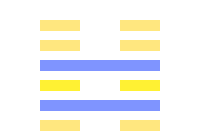
40.2.3.4 (40 > 15) - THE KIEH HEXAGRAM.
- 2. The second line, undivided, shows its subject catch, in hunting, three foxes, and obtain the yellow ( = golden) arrows. With firm correctness there will be good fortune.
- 3. The third line, divided, shows a porter with his burden, (yet) riding in a carriage. He will (only) tempt robbers to attack him. However firm and correct he may (try to) be, there will be cause for regret.
- 4. (To the subject of) the fourth line, undivided, (it is said), ‘Remove your toes. Friends will (then) come, between you and whom there will be mutual confidence.’
40.2.3.4 (40 > 15) - Stop quarreling
One can easily harmonize once a compromise has been found.
Bing DeepL Google Yandex40.2.3.4 (40 > 15) - Stop quarreling
One can easily harmonize once a compromise has been found.
Bing DeepL Google Yandex40.2.3.4 (40 > 15) - Kieh, la libération
Kieh : 1. Délivrer, faire échapper, échapper au danger ; 2. Disperser ; 3. Ouvrir, séparer, s’ouvrir. Se dit du mouvement de la germination. 4. Résoudre une difficulté, une complication.
- 2. Délivrer est aussi heureux que, pour le chasseur, prendre trois renards et obtenir le prix, la flèche d’or. — Celui qui résout une difficulté, fait sortir d’une position difficile, est comme le chasseur qui prend trois renards et obtient la flèche d’or.
-
3. Si un porteur se met dans un char et qu’il survienne des voleurs, il sera attaqué et échappera difficilement ; s’il abandonne sa charge, il pourra se sauver.
Pour un porteur, aller en char est honteux ; c’est attirer sur soi les voleurs.
Il n’appartient pas à des gens du commun d’aller en char . -
4. Échappez d’abord et après cela les amis viendront témoigner leur fidélité (sinon ils vous abandonnent).
Note. Le mot qui signifie ordinairement gros orteil est expliqué par les commentateurs comme ayant ici le sens de tchū, commencement, d’abord
40.2.3.4 (40 > 15) - Arrêter de se quereller
On peut harmoniser avec aisance une fois qu'un compromis a été trouvé.
Bing DeepL Google Yandex40.2.3.4 (40 > 15) - Módosítás
- 2. Megkérik hogy válaszokat keressen mielőtt túl késő.
- 3. Ha valaki elhanyagolja, másoknak adja.
- 4. Ajtók fognak megnyílni ha valaki felhagy a felesleges kényelemkereséssel.
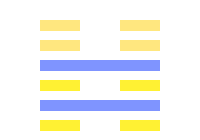
40.1.2.3.4 (40 > 36) - THE KIEH HEXAGRAM.
- 1. The first line, divided, shows that its subject will commit no error.
- 2. The second line, undivided, shows its subject catch, in hunting, three foxes, and obtain the yellow ( = golden) arrows. With firm correctness there will be good fortune.
- 3. The third line, divided, shows a porter with his burden, (yet) riding in a carriage. He will (only) tempt robbers to attack him. However firm and correct he may (try to) be, there will be cause for regret.
- 4. (To the subject of) the fourth line, undivided, (it is said), ‘Remove your toes. Friends will (then) come, between you and whom there will be mutual confidence.’
40.1.2.3.4 (40 > 36) - Sweeping the resistances
One turns against those who wanted to oppose the break-up.
Bing DeepL Google Yandex40.1.2.3.4 (40 > 36) - Sweeping the resistances
One turns against those who wanted to oppose the break-up.
Bing DeepL Google Yandex40.1.2.3.4 (40 > 36) - Kieh, la libération
Kieh : 1. Délivrer, faire échapper, échapper au danger ; 2. Disperser ; 3. Ouvrir, séparer, s’ouvrir. Se dit du mouvement de la germination. 4. Résoudre une difficulté, une complication.
-
1. Délivrer quelqu’un est chose excellente.
Quand le fort et le faible s’entendent selon la justice, il n’y a pas de faute à craindre. - 2. Délivrer est aussi heureux que, pour le chasseur, prendre trois renards et obtenir le prix, la flèche d’or. — Celui qui résout une difficulté, fait sortir d’une position difficile, est comme le chasseur qui prend trois renards et obtient la flèche d’or.
-
3. Si un porteur se met dans un char et qu’il survienne des voleurs, il sera attaqué et échappera difficilement ; s’il abandonne sa charge, il pourra se sauver.
Pour un porteur, aller en char est honteux ; c’est attirer sur soi les voleurs.
Il n’appartient pas à des gens du commun d’aller en char . -
4. Échappez d’abord et après cela les amis viendront témoigner leur fidélité (sinon ils vous abandonnent).
Note. Le mot qui signifie ordinairement gros orteil est expliqué par les commentateurs comme ayant ici le sens de tchū, commencement, d’abord
40.1.2.3.4 (40 > 36) - Balayer les résistances
On se retourne contre ceux qui ont voulu s'opposer à la rupture.
Bing DeepL Google Yandex40.1.2.3.4 (40 > 36) - Módosítás
- 1. Fel akarja szabadítani magát, ez egy jó döntés.
- 2. Megkérik hogy válaszokat keressen mielőtt túl késő.
- 3. Ha valaki elhanyagolja, másoknak adja.
- 4. Ajtók fognak megnyílni ha valaki felhagy a felesleges kényelemkereséssel.

40.4.5 (40 > 29) - THE KIEH HEXAGRAM.
- 4. (To the subject of) the fourth line, undivided, (it is said), ‘Remove your toes. Friends will (then) come, between you and whom there will be mutual confidence.’
- 5. The fifth line, divided, shows (its subject), the superior man ( = the ruler), executing his function of removing (whatever is injurious to the idea of the hexagram), in which case there will be good fortune, and confidence in him will be shown even by the small men.
40.4.5 (40 > 29) - Abandoning one' s support
One reflects on everything one has done to help those who have left without leaving an address.
Bing DeepL Google Yandex40.4.5 (40 > 29) - Abandoning one' s support
One reflects on everything one has done to help those who have left without leaving an address.
Bing DeepL Google Yandex40.4.5 (40 > 29) - Kieh, la libération
Kieh : 1. Délivrer, faire échapper, échapper au danger ; 2. Disperser ; 3. Ouvrir, séparer, s’ouvrir. Se dit du mouvement de la germination. 4. Résoudre une difficulté, une complication.
-
4. Échappez d’abord et après cela les amis viendront témoigner leur fidélité (sinon ils vous abandonnent).
Note. Le mot qui signifie ordinairement gros orteil est expliqué par les commentateurs comme ayant ici le sens de tchū, commencement, d’abord - 5. C’est au sage d’écarter (les maux) et de résoudre (les difficultés) ; s’il y réussit, il gagnera la confiance du vulgaire.
40.4.5 (40 > 29) - Abandonner ses soutiens
On repense à tout ce qu'on a fait pour aider ceux qui sont partis sans laisser d'adresse.
Bing DeepL Google Yandex40.4.5 (40 > 29) - Módosítás
- 4. Ajtók fognak megnyílni ha valaki felhagy a felesleges kényelemkereséssel.
- 5. Csak egy alkalmas személy tudja megmutatni a megoldást.

40.1.4.5 (40 > 60) - THE KIEH HEXAGRAM.
- 1. The first line, divided, shows that its subject will commit no error.
- 4. (To the subject of) the fourth line, undivided, (it is said), ‘Remove your toes. Friends will (then) come, between you and whom there will be mutual confidence.’
- 5. The fifth line, divided, shows (its subject), the superior man ( = the ruler), executing his function of removing (whatever is injurious to the idea of the hexagram), in which case there will be good fortune, and confidence in him will be shown even by the small men.
40.1.4.5 (40 > 60) - Defending one's borders
When one is smart, one does not let disorder set in.
Bing DeepL Google Yandex40.1.4.5 (40 > 60) - Defending one's borders
When one is smart, one does not let disorder set in.
Bing DeepL Google Yandex40.1.4.5 (40 > 60) - Kieh, la libération
Kieh : 1. Délivrer, faire échapper, échapper au danger ; 2. Disperser ; 3. Ouvrir, séparer, s’ouvrir. Se dit du mouvement de la germination. 4. Résoudre une difficulté, une complication.
-
1. Délivrer quelqu’un est chose excellente.
Quand le fort et le faible s’entendent selon la justice, il n’y a pas de faute à craindre. -
4. Échappez d’abord et après cela les amis viendront témoigner leur fidélité (sinon ils vous abandonnent).
Note. Le mot qui signifie ordinairement gros orteil est expliqué par les commentateurs comme ayant ici le sens de tchū, commencement, d’abord - 5. C’est au sage d’écarter (les maux) et de résoudre (les difficultés) ; s’il y réussit, il gagnera la confiance du vulgaire.
40.1.4.5 (40 > 60) - Défendre ses frontières
Quand on est intelligent on ne laisse pas le désordre s'installer.
Bing DeepL Google Yandex40.1.4.5 (40 > 60) - Módosítás
- 1. Fel akarja szabadítani magát, ez egy jó döntés.
- 4. Ajtók fognak megnyílni ha valaki felhagy a felesleges kényelemkereséssel.
- 5. Csak egy alkalmas személy tudja megmutatni a megoldást.
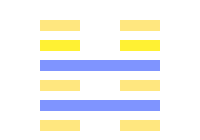
40.2.4.5 (40 > 8) - THE KIEH HEXAGRAM.
- 2. The second line, undivided, shows its subject catch, in hunting, three foxes, and obtain the yellow ( = golden) arrows. With firm correctness there will be good fortune.
- 4. (To the subject of) the fourth line, undivided, (it is said), ‘Remove your toes. Friends will (then) come, between you and whom there will be mutual confidence.’
- 5. The fifth line, divided, shows (its subject), the superior man ( = the ruler), executing his function of removing (whatever is injurious to the idea of the hexagram), in which case there will be good fortune, and confidence in him will be shown even by the small men.
40.2.4.5 (40 > 8) - Dominating by speech
One can end up believing what the others say when they express themselves skillfully.
Bing DeepL Google Yandex40.2.4.5 (40 > 8) - Dominating by speech
One can end up believing what the others say when they express themselves skillfully.
Bing DeepL Google Yandex40.2.4.5 (40 > 8) - Kieh, la libération
Kieh : 1. Délivrer, faire échapper, échapper au danger ; 2. Disperser ; 3. Ouvrir, séparer, s’ouvrir. Se dit du mouvement de la germination. 4. Résoudre une difficulté, une complication.
- 2. Délivrer est aussi heureux que, pour le chasseur, prendre trois renards et obtenir le prix, la flèche d’or. — Celui qui résout une difficulté, fait sortir d’une position difficile, est comme le chasseur qui prend trois renards et obtient la flèche d’or.
-
4. Échappez d’abord et après cela les amis viendront témoigner leur fidélité (sinon ils vous abandonnent).
Note. Le mot qui signifie ordinairement gros orteil est expliqué par les commentateurs comme ayant ici le sens de tchū, commencement, d’abord - 5. C’est au sage d’écarter (les maux) et de résoudre (les difficultés) ; s’il y réussit, il gagnera la confiance du vulgaire.
40.2.4.5 (40 > 8) - Dominer par la parole
On peut finir par croire ce que les autres disent quand ils s'expriment avec talent.
Bing DeepL Google Yandex40.2.4.5 (40 > 8) - Módosítás
- 2. Megkérik hogy válaszokat keressen mielőtt túl késő.
- 4. Ajtók fognak megnyílni ha valaki felhagy a felesleges kényelemkereséssel.
- 5. Csak egy alkalmas személy tudja megmutatni a megoldást.
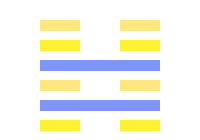
40.1.2.4.5 (40 > 3) - THE KIEH HEXAGRAM.
- 1. The first line, divided, shows that its subject will commit no error.
- 2. The second line, undivided, shows its subject catch, in hunting, three foxes, and obtain the yellow ( = golden) arrows. With firm correctness there will be good fortune.
- 4. (To the subject of) the fourth line, undivided, (it is said), ‘Remove your toes. Friends will (then) come, between you and whom there will be mutual confidence.’
- 5. The fifth line, divided, shows (its subject), the superior man ( = the ruler), executing his function of removing (whatever is injurious to the idea of the hexagram), in which case there will be good fortune, and confidence in him will be shown even by the small men.
40.1.2.4.5 (40 > 3) - Plundering the planet's resources
One digs into nature reserves to feed those who are not yet free from the need for comfort.
Bing DeepL Google Yandex40.1.2.4.5 (40 > 3) - Plundering the planet's resources
One digs into nature reserves to feed those who are not yet free from the need for comfort.
Bing DeepL Google Yandex40.1.2.4.5 (40 > 3) - Kieh, la libération
Kieh : 1. Délivrer, faire échapper, échapper au danger ; 2. Disperser ; 3. Ouvrir, séparer, s’ouvrir. Se dit du mouvement de la germination. 4. Résoudre une difficulté, une complication.
-
1. Délivrer quelqu’un est chose excellente.
Quand le fort et le faible s’entendent selon la justice, il n’y a pas de faute à craindre. - 2. Délivrer est aussi heureux que, pour le chasseur, prendre trois renards et obtenir le prix, la flèche d’or. — Celui qui résout une difficulté, fait sortir d’une position difficile, est comme le chasseur qui prend trois renards et obtient la flèche d’or.
-
4. Échappez d’abord et après cela les amis viendront témoigner leur fidélité (sinon ils vous abandonnent).
Note. Le mot qui signifie ordinairement gros orteil est expliqué par les commentateurs comme ayant ici le sens de tchū, commencement, d’abord - 5. C’est au sage d’écarter (les maux) et de résoudre (les difficultés) ; s’il y réussit, il gagnera la confiance du vulgaire.
40.1.2.4.5 (40 > 3) - Piller les ressources de la planète
On pioche dans les réserves naturelles pour alimenter ceux qui ne sont pas encore affranchis du besoin de confort.
Bing DeepL Google Yandex40.1.2.4.5 (40 > 3) - Módosítás
- 1. Fel akarja szabadítani magát, ez egy jó döntés.
- 2. Megkérik hogy válaszokat keressen mielőtt túl késő.
- 4. Ajtók fognak megnyílni ha valaki felhagy a felesleges kényelemkereséssel.
- 5. Csak egy alkalmas személy tudja megmutatni a megoldást.

40.3.4.5 (40 > 48) - THE KIEH HEXAGRAM.
- 3. The third line, divided, shows a porter with his burden, (yet) riding in a carriage. He will (only) tempt robbers to attack him. However firm and correct he may (try to) be, there will be cause for regret.
- 4. (To the subject of) the fourth line, undivided, (it is said), ‘Remove your toes. Friends will (then) come, between you and whom there will be mutual confidence.’
- 5. The fifth line, divided, shows (its subject), the superior man ( = the ruler), executing his function of removing (whatever is injurious to the idea of the hexagram), in which case there will be good fortune, and confidence in him will be shown even by the small men.
40.3.4.5 (40 > 48) - Detaching oneself from old interests
One regains freedom after having been conquered.
Bing DeepL Google Yandex40.3.4.5 (40 > 48) - Detaching oneself from old interests
One regains freedom after having been conquered.
Bing DeepL Google Yandex40.3.4.5 (40 > 48) - Kieh, la libération
Kieh : 1. Délivrer, faire échapper, échapper au danger ; 2. Disperser ; 3. Ouvrir, séparer, s’ouvrir. Se dit du mouvement de la germination. 4. Résoudre une difficulté, une complication.
-
3. Si un porteur se met dans un char et qu’il survienne des voleurs, il sera attaqué et échappera difficilement ; s’il abandonne sa charge, il pourra se sauver.
Pour un porteur, aller en char est honteux ; c’est attirer sur soi les voleurs.
Il n’appartient pas à des gens du commun d’aller en char . -
4. Échappez d’abord et après cela les amis viendront témoigner leur fidélité (sinon ils vous abandonnent).
Note. Le mot qui signifie ordinairement gros orteil est expliqué par les commentateurs comme ayant ici le sens de tchū, commencement, d’abord - 5. C’est au sage d’écarter (les maux) et de résoudre (les difficultés) ; s’il y réussit, il gagnera la confiance du vulgaire.
40.3.4.5 (40 > 48) - Se détacher de ses anciens intérêts
On reprend sa liberté après avoir été conquis.
Bing DeepL Google Yandex40.3.4.5 (40 > 48) - Módosítás
- 3. Ha valaki elhanyagolja, másoknak adja.
- 4. Ajtók fognak megnyílni ha valaki felhagy a felesleges kényelemkereséssel.
- 5. Csak egy alkalmas személy tudja megmutatni a megoldást.

40.1.3.4.5 (40 > 5) - THE KIEH HEXAGRAM.
- 1. The first line, divided, shows that its subject will commit no error.
- 3. The third line, divided, shows a porter with his burden, (yet) riding in a carriage. He will (only) tempt robbers to attack him. However firm and correct he may (try to) be, there will be cause for regret.
- 4. (To the subject of) the fourth line, undivided, (it is said), ‘Remove your toes. Friends will (then) come, between you and whom there will be mutual confidence.’
- 5. The fifth line, divided, shows (its subject), the superior man ( = the ruler), executing his function of removing (whatever is injurious to the idea of the hexagram), in which case there will be good fortune, and confidence in him will be shown even by the small men.
40.1.3.4.5 (40 > 5) - Assuming one's responsibilities
One will be able to do what is necessary to avoid regretting having acquired rights.
Bing DeepL Google Yandex40.1.3.4.5 (40 > 5) - Assuming one's responsibilities
One will be able to do what is necessary to avoid regretting having acquired rights.
Bing DeepL Google Yandex40.1.3.4.5 (40 > 5) - Kieh, la libération
Kieh : 1. Délivrer, faire échapper, échapper au danger ; 2. Disperser ; 3. Ouvrir, séparer, s’ouvrir. Se dit du mouvement de la germination. 4. Résoudre une difficulté, une complication.
-
1. Délivrer quelqu’un est chose excellente.
Quand le fort et le faible s’entendent selon la justice, il n’y a pas de faute à craindre. -
3. Si un porteur se met dans un char et qu’il survienne des voleurs, il sera attaqué et échappera difficilement ; s’il abandonne sa charge, il pourra se sauver.
Pour un porteur, aller en char est honteux ; c’est attirer sur soi les voleurs.
Il n’appartient pas à des gens du commun d’aller en char . -
4. Échappez d’abord et après cela les amis viendront témoigner leur fidélité (sinon ils vous abandonnent).
Note. Le mot qui signifie ordinairement gros orteil est expliqué par les commentateurs comme ayant ici le sens de tchū, commencement, d’abord - 5. C’est au sage d’écarter (les maux) et de résoudre (les difficultés) ; s’il y réussit, il gagnera la confiance du vulgaire.
40.1.3.4.5 (40 > 5) - Assumer ses responsabilités
On saura faire le nécessaire pour ne pas avoir à regretter d'avoir acquis des droits.
Bing DeepL Google Yandex40.1.3.4.5 (40 > 5) - Módosítás
- 1. Fel akarja szabadítani magát, ez egy jó döntés.
- 3. Ha valaki elhanyagolja, másoknak adja.
- 4. Ajtók fognak megnyílni ha valaki felhagy a felesleges kényelemkereséssel.
- 5. Csak egy alkalmas személy tudja megmutatni a megoldást.
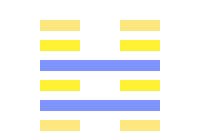
40.2.3.4.5 (40 > 39) - THE KIEH HEXAGRAM.
- 2. The second line, undivided, shows its subject catch, in hunting, three foxes, and obtain the yellow ( = golden) arrows. With firm correctness there will be good fortune.
- 3. The third line, divided, shows a porter with his burden, (yet) riding in a carriage. He will (only) tempt robbers to attack him. However firm and correct he may (try to) be, there will be cause for regret.
- 4. (To the subject of) the fourth line, undivided, (it is said), ‘Remove your toes. Friends will (then) come, between you and whom there will be mutual confidence.’
- 5. The fifth line, divided, shows (its subject), the superior man ( = the ruler), executing his function of removing (whatever is injurious to the idea of the hexagram), in which case there will be good fortune, and confidence in him will be shown even by the small men.
40.2.3.4.5 (40 > 39) - Complying with the established rule
One refuses to satisfy unusual requests.
Bing DeepL Google Yandex40.2.3.4.5 (40 > 39) - Complying with the established rule
One refuses to satisfy unusual requests.
Bing DeepL Google Yandex40.2.3.4.5 (40 > 39) - Kieh, la libération
Kieh : 1. Délivrer, faire échapper, échapper au danger ; 2. Disperser ; 3. Ouvrir, séparer, s’ouvrir. Se dit du mouvement de la germination. 4. Résoudre une difficulté, une complication.
- 2. Délivrer est aussi heureux que, pour le chasseur, prendre trois renards et obtenir le prix, la flèche d’or. — Celui qui résout une difficulté, fait sortir d’une position difficile, est comme le chasseur qui prend trois renards et obtient la flèche d’or.
-
3. Si un porteur se met dans un char et qu’il survienne des voleurs, il sera attaqué et échappera difficilement ; s’il abandonne sa charge, il pourra se sauver.
Pour un porteur, aller en char est honteux ; c’est attirer sur soi les voleurs.
Il n’appartient pas à des gens du commun d’aller en char . -
4. Échappez d’abord et après cela les amis viendront témoigner leur fidélité (sinon ils vous abandonnent).
Note. Le mot qui signifie ordinairement gros orteil est expliqué par les commentateurs comme ayant ici le sens de tchū, commencement, d’abord - 5. C’est au sage d’écarter (les maux) et de résoudre (les difficultés) ; s’il y réussit, il gagnera la confiance du vulgaire.
40.2.3.4.5 (40 > 39) - Se conformer à la règle établie
On refuse de satisfaire des demandes inhabituelles.
Bing DeepL Google Yandex40.2.3.4.5 (40 > 39) - Módosítás
- 2. Megkérik hogy válaszokat keressen mielőtt túl késő.
- 3. Ha valaki elhanyagolja, másoknak adja.
- 4. Ajtók fognak megnyílni ha valaki felhagy a felesleges kényelemkereséssel.
- 5. Csak egy alkalmas személy tudja megmutatni a megoldást.
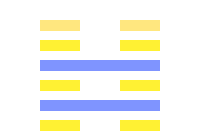
40.1.2.3.4.5 (40 > 63) - THE KIEH HEXAGRAM.
- 1. The first line, divided, shows that its subject will commit no error.
- 2. The second line, undivided, shows its subject catch, in hunting, three foxes, and obtain the yellow ( = golden) arrows. With firm correctness there will be good fortune.
- 3. The third line, divided, shows a porter with his burden, (yet) riding in a carriage. He will (only) tempt robbers to attack him. However firm and correct he may (try to) be, there will be cause for regret.
- 4. (To the subject of) the fourth line, undivided, (it is said), ‘Remove your toes. Friends will (then) come, between you and whom there will be mutual confidence.’
- 5. The fifth line, divided, shows (its subject), the superior man ( = the ruler), executing his function of removing (whatever is injurious to the idea of the hexagram), in which case there will be good fortune, and confidence in him will be shown even by the small men.
40.1.2.3.4.5 (40 > 63) - Behaving
One has respect for those who can take everything one has.
Bing DeepL Google Yandex40.1.2.3.4.5 (40 > 63) - Behaving
One has respect for those who can take everything one has.
Bing DeepL Google Yandex40.1.2.3.4.5 (40 > 63) - Kieh, la libération
Kieh : 1. Délivrer, faire échapper, échapper au danger ; 2. Disperser ; 3. Ouvrir, séparer, s’ouvrir. Se dit du mouvement de la germination. 4. Résoudre une difficulté, une complication.
-
1. Délivrer quelqu’un est chose excellente.
Quand le fort et le faible s’entendent selon la justice, il n’y a pas de faute à craindre. - 2. Délivrer est aussi heureux que, pour le chasseur, prendre trois renards et obtenir le prix, la flèche d’or. — Celui qui résout une difficulté, fait sortir d’une position difficile, est comme le chasseur qui prend trois renards et obtient la flèche d’or.
-
3. Si un porteur se met dans un char et qu’il survienne des voleurs, il sera attaqué et échappera difficilement ; s’il abandonne sa charge, il pourra se sauver.
Pour un porteur, aller en char est honteux ; c’est attirer sur soi les voleurs.
Il n’appartient pas à des gens du commun d’aller en char . -
4. Échappez d’abord et après cela les amis viendront témoigner leur fidélité (sinon ils vous abandonnent).
Note. Le mot qui signifie ordinairement gros orteil est expliqué par les commentateurs comme ayant ici le sens de tchū, commencement, d’abord - 5. C’est au sage d’écarter (les maux) et de résoudre (les difficultés) ; s’il y réussit, il gagnera la confiance du vulgaire.
40.1.2.3.4.5 (40 > 63) - Se tenir à carreaux
On a du respect envers ceux qui peuvent prendre tout ce qu'on possède.
Bing DeepL Google Yandex40.1.2.3.4.5 (40 > 63) - Módosítás
- 1. Fel akarja szabadítani magát, ez egy jó döntés.
- 2. Megkérik hogy válaszokat keressen mielőtt túl késő.
- 3. Ha valaki elhanyagolja, másoknak adja.
- 4. Ajtók fognak megnyílni ha valaki felhagy a felesleges kényelemkereséssel.
- 5. Csak egy alkalmas személy tudja megmutatni a megoldást.

40.4.6 (40 > 4) - THE KIEH HEXAGRAM.
- 4. (To the subject of) the fourth line, undivided, (it is said), ‘Remove your toes. Friends will (then) come, between you and whom there will be mutual confidence.’
- 6. In the sixth line, divided, we see a feudal prince (with his bow) shooting at a falcon on the top of a high wall, and hitting it. (The effect of his action) will be in every way advantageous.
40.4.6 (40 > 4) - Preparing for revenge
One prepares bitter gifts for those who did not surrender to the arguments submitted to them.
Bing DeepL Google Yandex40.4.6 (40 > 4) - Preparing for revenge
One prepares bitter gifts for those who did not surrender to the arguments submitted to them.
Bing DeepL Google Yandex40.4.6 (40 > 4) - Kieh, la libération
Kieh : 1. Délivrer, faire échapper, échapper au danger ; 2. Disperser ; 3. Ouvrir, séparer, s’ouvrir. Se dit du mouvement de la germination. 4. Résoudre une difficulté, une complication.
-
4. Échappez d’abord et après cela les amis viendront témoigner leur fidélité (sinon ils vous abandonnent).
Note. Le mot qui signifie ordinairement gros orteil est expliqué par les commentateurs comme ayant ici le sens de tchū, commencement, d’abord - 6. Si le prince est assez habile pour atteindre d’une flèche un faucon posé sur le haut d’un mur élevé, il aura le succès et saura disperser les rebelles.
40.4.6 (40 > 4) - Préparer sa revanche
On prépare d'amers présents à l'intention de ceux qui n'ont pas voulu se rendre aux arguments qu'on leur a soumis.
Bing DeepL Google Yandex40.4.6 (40 > 4) - Módosítás
- 4. Ajtók fognak megnyílni ha valaki felhagy a felesleges kényelemkereséssel.
- 6. Miután felkészül, meg tudja oldani a problémákat időben.

40.1.4.6 (40 > 41) - THE KIEH HEXAGRAM.
- 1. The first line, divided, shows that its subject will commit no error.
- 4. (To the subject of) the fourth line, undivided, (it is said), ‘Remove your toes. Friends will (then) come, between you and whom there will be mutual confidence.’
- 6. In the sixth line, divided, we see a feudal prince (with his bow) shooting at a falcon on the top of a high wall, and hitting it. (The effect of his action) will be in every way advantageous.
40.1.4.6 (40 > 41) - Keeping calm
One pleases one's relatives because one does not give in.
Bing DeepL Google Yandex40.1.4.6 (40 > 41) - Keeping calm
One pleases one's relatives because one does not give in.
Bing DeepL Google Yandex40.1.4.6 (40 > 41) - Kieh, la libération
Kieh : 1. Délivrer, faire échapper, échapper au danger ; 2. Disperser ; 3. Ouvrir, séparer, s’ouvrir. Se dit du mouvement de la germination. 4. Résoudre une difficulté, une complication.
-
1. Délivrer quelqu’un est chose excellente.
Quand le fort et le faible s’entendent selon la justice, il n’y a pas de faute à craindre. -
4. Échappez d’abord et après cela les amis viendront témoigner leur fidélité (sinon ils vous abandonnent).
Note. Le mot qui signifie ordinairement gros orteil est expliqué par les commentateurs comme ayant ici le sens de tchū, commencement, d’abord - 6. Si le prince est assez habile pour atteindre d’une flèche un faucon posé sur le haut d’un mur élevé, il aura le succès et saura disperser les rebelles.
40.1.4.6 (40 > 41) - Garder son calme
On fait plaisir à ses proches car on ne cède pas.
Bing DeepL Google Yandex40.1.4.6 (40 > 41) - Módosítás
- 1. Fel akarja szabadítani magát, ez egy jó döntés.
- 4. Ajtók fognak megnyílni ha valaki felhagy a felesleges kényelemkereséssel.
- 6. Miután felkészül, meg tudja oldani a problémákat időben.
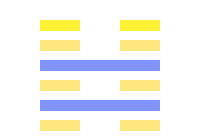
40.2.4.6 (40 > 23) - THE KIEH HEXAGRAM.
- 2. The second line, undivided, shows its subject catch, in hunting, three foxes, and obtain the yellow ( = golden) arrows. With firm correctness there will be good fortune.
- 4. (To the subject of) the fourth line, undivided, (it is said), ‘Remove your toes. Friends will (then) come, between you and whom there will be mutual confidence.’
- 6. In the sixth line, divided, we see a feudal prince (with his bow) shooting at a falcon on the top of a high wall, and hitting it. (The effect of his action) will be in every way advantageous.
40.2.4.6 (40 > 23) - Distinguishing between good and evil
One receives more dishonest proposals than sincere offers.
Bing DeepL Google Yandex40.2.4.6 (40 > 23) - Distinguishing between good and evil
One receives more dishonest proposals than sincere offers.
Bing DeepL Google Yandex40.2.4.6 (40 > 23) - Kieh, la libération
Kieh : 1. Délivrer, faire échapper, échapper au danger ; 2. Disperser ; 3. Ouvrir, séparer, s’ouvrir. Se dit du mouvement de la germination. 4. Résoudre une difficulté, une complication.
- 2. Délivrer est aussi heureux que, pour le chasseur, prendre trois renards et obtenir le prix, la flèche d’or. — Celui qui résout une difficulté, fait sortir d’une position difficile, est comme le chasseur qui prend trois renards et obtient la flèche d’or.
-
4. Échappez d’abord et après cela les amis viendront témoigner leur fidélité (sinon ils vous abandonnent).
Note. Le mot qui signifie ordinairement gros orteil est expliqué par les commentateurs comme ayant ici le sens de tchū, commencement, d’abord - 6. Si le prince est assez habile pour atteindre d’une flèche un faucon posé sur le haut d’un mur élevé, il aura le succès et saura disperser les rebelles.
40.2.4.6 (40 > 23) - Faire la distinction entre le bien et le mal
On reçoit davantage de propositions malhonnêtes que d'offres sincères.
Bing DeepL Google Yandex40.2.4.6 (40 > 23) - Módosítás
- 2. Megkérik hogy válaszokat keressen mielőtt túl késő.
- 4. Ajtók fognak megnyílni ha valaki felhagy a felesleges kényelemkereséssel.
- 6. Miután felkészül, meg tudja oldani a problémákat időben.
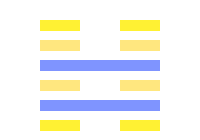
40.1.2.4.6 (40 > 27) - THE KIEH HEXAGRAM.
- 1. The first line, divided, shows that its subject will commit no error.
- 2. The second line, undivided, shows its subject catch, in hunting, three foxes, and obtain the yellow ( = golden) arrows. With firm correctness there will be good fortune.
- 4. (To the subject of) the fourth line, undivided, (it is said), ‘Remove your toes. Friends will (then) come, between you and whom there will be mutual confidence.’
- 6. In the sixth line, divided, we see a feudal prince (with his bow) shooting at a falcon on the top of a high wall, and hitting it. (The effect of his action) will be in every way advantageous.
40.1.2.4.6 (40 > 27) - Serving foreign interests
One embraces a cause that others have not wanted to support.
Bing DeepL Google Yandex40.1.2.4.6 (40 > 27) - Serving foreign interests
One embraces a cause that others have not wanted to support.
Bing DeepL Google Yandex40.1.2.4.6 (40 > 27) - Kieh, la libération
Kieh : 1. Délivrer, faire échapper, échapper au danger ; 2. Disperser ; 3. Ouvrir, séparer, s’ouvrir. Se dit du mouvement de la germination. 4. Résoudre une difficulté, une complication.
-
1. Délivrer quelqu’un est chose excellente.
Quand le fort et le faible s’entendent selon la justice, il n’y a pas de faute à craindre. - 2. Délivrer est aussi heureux que, pour le chasseur, prendre trois renards et obtenir le prix, la flèche d’or. — Celui qui résout une difficulté, fait sortir d’une position difficile, est comme le chasseur qui prend trois renards et obtient la flèche d’or.
-
4. Échappez d’abord et après cela les amis viendront témoigner leur fidélité (sinon ils vous abandonnent).
Note. Le mot qui signifie ordinairement gros orteil est expliqué par les commentateurs comme ayant ici le sens de tchū, commencement, d’abord - 6. Si le prince est assez habile pour atteindre d’une flèche un faucon posé sur le haut d’un mur élevé, il aura le succès et saura disperser les rebelles.
40.1.2.4.6 (40 > 27) - Servir des intérêts étrangers
On épouse une cause que les autres n'ont pas voulu soutenir.
Bing DeepL Google Yandex40.1.2.4.6 (40 > 27) - Módosítás
- 1. Fel akarja szabadítani magát, ez egy jó döntés.
- 2. Megkérik hogy válaszokat keressen mielőtt túl késő.
- 4. Ajtók fognak megnyílni ha valaki felhagy a felesleges kényelemkereséssel.
- 6. Miután felkészül, meg tudja oldani a problémákat időben.

40.3.4.6 (40 > 18) - THE KIEH HEXAGRAM.
- 3. The third line, divided, shows a porter with his burden, (yet) riding in a carriage. He will (only) tempt robbers to attack him. However firm and correct he may (try to) be, there will be cause for regret.
- 4. (To the subject of) the fourth line, undivided, (it is said), ‘Remove your toes. Friends will (then) come, between you and whom there will be mutual confidence.’
- 6. In the sixth line, divided, we see a feudal prince (with his bow) shooting at a falcon on the top of a high wall, and hitting it. (The effect of his action) will be in every way advantageous.
40.3.4.6 (40 > 18) - Being attacked unexpectedly
One begins by being assaulted and then the others realise their mistake.
Bing DeepL Google Yandex40.3.4.6 (40 > 18) - Being attacked unexpectedly
One begins by being assaulted and then the others realize their mistake.
Bing DeepL Google Yandex40.3.4.6 (40 > 18) - Kieh, la libération
Kieh : 1. Délivrer, faire échapper, échapper au danger ; 2. Disperser ; 3. Ouvrir, séparer, s’ouvrir. Se dit du mouvement de la germination. 4. Résoudre une difficulté, une complication.
-
3. Si un porteur se met dans un char et qu’il survienne des voleurs, il sera attaqué et échappera difficilement ; s’il abandonne sa charge, il pourra se sauver.
Pour un porteur, aller en char est honteux ; c’est attirer sur soi les voleurs.
Il n’appartient pas à des gens du commun d’aller en char . -
4. Échappez d’abord et après cela les amis viendront témoigner leur fidélité (sinon ils vous abandonnent).
Note. Le mot qui signifie ordinairement gros orteil est expliqué par les commentateurs comme ayant ici le sens de tchū, commencement, d’abord - 6. Si le prince est assez habile pour atteindre d’une flèche un faucon posé sur le haut d’un mur élevé, il aura le succès et saura disperser les rebelles.
40.3.4.6 (40 > 18) - Subir une attaque imprévue
On commence par se faire agresser puis les autres se s'aperçoivent de leur erreur.
Bing DeepL Google Yandex40.3.4.6 (40 > 18) - Módosítás
- 3. Ha valaki elhanyagolja, másoknak adja.
- 4. Ajtók fognak megnyílni ha valaki felhagy a felesleges kényelemkereséssel.
- 6. Miután felkészül, meg tudja oldani a problémákat időben.

40.1.3.4.6 (40 > 26) - THE KIEH HEXAGRAM.
- 1. The first line, divided, shows that its subject will commit no error.
- 3. The third line, divided, shows a porter with his burden, (yet) riding in a carriage. He will (only) tempt robbers to attack him. However firm and correct he may (try to) be, there will be cause for regret.
- 4. (To the subject of) the fourth line, undivided, (it is said), ‘Remove your toes. Friends will (then) come, between you and whom there will be mutual confidence.’
- 6. In the sixth line, divided, we see a feudal prince (with his bow) shooting at a falcon on the top of a high wall, and hitting it. (The effect of his action) will be in every way advantageous.
40.1.3.4.6 (40 > 26) - Stepping down
One introduces one's true descendants to one's old customers.
Bing DeepL Google Yandex40.1.3.4.6 (40 > 26) - Stepping down
One introduces one's true descendants to one's old customers.
Bing DeepL Google Yandex40.1.3.4.6 (40 > 26) - Kieh, la libération
Kieh : 1. Délivrer, faire échapper, échapper au danger ; 2. Disperser ; 3. Ouvrir, séparer, s’ouvrir. Se dit du mouvement de la germination. 4. Résoudre une difficulté, une complication.
-
1. Délivrer quelqu’un est chose excellente.
Quand le fort et le faible s’entendent selon la justice, il n’y a pas de faute à craindre. -
3. Si un porteur se met dans un char et qu’il survienne des voleurs, il sera attaqué et échappera difficilement ; s’il abandonne sa charge, il pourra se sauver.
Pour un porteur, aller en char est honteux ; c’est attirer sur soi les voleurs.
Il n’appartient pas à des gens du commun d’aller en char . -
4. Échappez d’abord et après cela les amis viendront témoigner leur fidélité (sinon ils vous abandonnent).
Note. Le mot qui signifie ordinairement gros orteil est expliqué par les commentateurs comme ayant ici le sens de tchū, commencement, d’abord - 6. Si le prince est assez habile pour atteindre d’une flèche un faucon posé sur le haut d’un mur élevé, il aura le succès et saura disperser les rebelles.
40.1.3.4.6 (40 > 26) - Passer la main
On introduit sa vraie descendance auprès de ses vieux clients.
Bing DeepL Google Yandex40.1.3.4.6 (40 > 26) - Módosítás
- 1. Fel akarja szabadítani magát, ez egy jó döntés.
- 3. Ha valaki elhanyagolja, másoknak adja.
- 4. Ajtók fognak megnyílni ha valaki felhagy a felesleges kényelemkereséssel.
- 6. Miután felkészül, meg tudja oldani a problémákat időben.
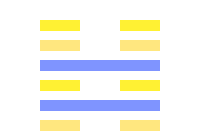
40.2.3.4.6 (40 > 52) - THE KIEH HEXAGRAM.
- 2. The second line, undivided, shows its subject catch, in hunting, three foxes, and obtain the yellow ( = golden) arrows. With firm correctness there will be good fortune.
- 3. The third line, divided, shows a porter with his burden, (yet) riding in a carriage. He will (only) tempt robbers to attack him. However firm and correct he may (try to) be, there will be cause for regret.
- 4. (To the subject of) the fourth line, undivided, (it is said), ‘Remove your toes. Friends will (then) come, between you and whom there will be mutual confidence.’
- 6. In the sixth line, divided, we see a feudal prince (with his bow) shooting at a falcon on the top of a high wall, and hitting it. (The effect of his action) will be in every way advantageous.
40.2.3.4.6 (40 > 52) - Being encouraged to continue
One makes another attempt because the others want one to get there.
Bing DeepL Google Yandex40.2.3.4.6 (40 > 52) - Being encouraged to continue
One makes another attempt because the others want one to get there.
Bing DeepL Google Yandex40.2.3.4.6 (40 > 52) - Kieh, la libération
Kieh : 1. Délivrer, faire échapper, échapper au danger ; 2. Disperser ; 3. Ouvrir, séparer, s’ouvrir. Se dit du mouvement de la germination. 4. Résoudre une difficulté, une complication.
- 2. Délivrer est aussi heureux que, pour le chasseur, prendre trois renards et obtenir le prix, la flèche d’or. — Celui qui résout une difficulté, fait sortir d’une position difficile, est comme le chasseur qui prend trois renards et obtient la flèche d’or.
-
3. Si un porteur se met dans un char et qu’il survienne des voleurs, il sera attaqué et échappera difficilement ; s’il abandonne sa charge, il pourra se sauver.
Pour un porteur, aller en char est honteux ; c’est attirer sur soi les voleurs.
Il n’appartient pas à des gens du commun d’aller en char . -
4. Échappez d’abord et après cela les amis viendront témoigner leur fidélité (sinon ils vous abandonnent).
Note. Le mot qui signifie ordinairement gros orteil est expliqué par les commentateurs comme ayant ici le sens de tchū, commencement, d’abord - 6. Si le prince est assez habile pour atteindre d’une flèche un faucon posé sur le haut d’un mur élevé, il aura le succès et saura disperser les rebelles.
40.2.3.4.6 (40 > 52) - Être encouragé à persévérer
On fait une tentative supplémentaire car les autres veulent qu'on y arrive.
Bing DeepL Google Yandex40.2.3.4.6 (40 > 52) - Módosítás
- 2. Megkérik hogy válaszokat keressen mielőtt túl késő.
- 3. Ha valaki elhanyagolja, másoknak adja.
- 4. Ajtók fognak megnyílni ha valaki felhagy a felesleges kényelemkereséssel.
- 6. Miután felkészül, meg tudja oldani a problémákat időben.
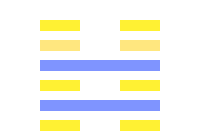
40.1.2.3.4.6 (40 > 22) - THE KIEH HEXAGRAM.
- 1. The first line, divided, shows that its subject will commit no error.
- 2. The second line, undivided, shows its subject catch, in hunting, three foxes, and obtain the yellow ( = golden) arrows. With firm correctness there will be good fortune.
- 3. The third line, divided, shows a porter with his burden, (yet) riding in a carriage. He will (only) tempt robbers to attack him. However firm and correct he may (try to) be, there will be cause for regret.
- 4. (To the subject of) the fourth line, undivided, (it is said), ‘Remove your toes. Friends will (then) come, between you and whom there will be mutual confidence.’
- 6. In the sixth line, divided, we see a feudal prince (with his bow) shooting at a falcon on the top of a high wall, and hitting it. (The effect of his action) will be in every way advantageous.
40.1.2.3.4.6 (40 > 22) - Ensuring compatibility
One applies loosely a regulation that has become obsolete.
Bing DeepL Google Yandex40.1.2.3.4.6 (40 > 22) - Ensuring compatibility
One applies loosely a regulation that has become obsolete.
Bing DeepL Google Yandex40.1.2.3.4.6 (40 > 22) - Kieh, la libération
Kieh : 1. Délivrer, faire échapper, échapper au danger ; 2. Disperser ; 3. Ouvrir, séparer, s’ouvrir. Se dit du mouvement de la germination. 4. Résoudre une difficulté, une complication.
-
1. Délivrer quelqu’un est chose excellente.
Quand le fort et le faible s’entendent selon la justice, il n’y a pas de faute à craindre. - 2. Délivrer est aussi heureux que, pour le chasseur, prendre trois renards et obtenir le prix, la flèche d’or. — Celui qui résout une difficulté, fait sortir d’une position difficile, est comme le chasseur qui prend trois renards et obtient la flèche d’or.
-
3. Si un porteur se met dans un char et qu’il survienne des voleurs, il sera attaqué et échappera difficilement ; s’il abandonne sa charge, il pourra se sauver.
Pour un porteur, aller en char est honteux ; c’est attirer sur soi les voleurs.
Il n’appartient pas à des gens du commun d’aller en char . -
4. Échappez d’abord et après cela les amis viendront témoigner leur fidélité (sinon ils vous abandonnent).
Note. Le mot qui signifie ordinairement gros orteil est expliqué par les commentateurs comme ayant ici le sens de tchū, commencement, d’abord - 6. Si le prince est assez habile pour atteindre d’une flèche un faucon posé sur le haut d’un mur élevé, il aura le succès et saura disperser les rebelles.
40.1.2.3.4.6 (40 > 22) - Assurer la compatibilité
On applique sans rigueur un règlement qui est devenu désuet.
Bing DeepL Google Yandex40.1.2.3.4.6 (40 > 22) - Módosítás
- 1. Fel akarja szabadítani magát, ez egy jó döntés.
- 2. Megkérik hogy válaszokat keressen mielőtt túl késő.
- 3. Ha valaki elhanyagolja, másoknak adja.
- 4. Ajtók fognak megnyílni ha valaki felhagy a felesleges kényelemkereséssel.
- 6. Miután felkészül, meg tudja oldani a problémákat időben.

40.4.5.6 (40 > 59) - THE KIEH HEXAGRAM.
- 4. (To the subject of) the fourth line, undivided, (it is said), ‘Remove your toes. Friends will (then) come, between you and whom there will be mutual confidence.’
- 5. The fifth line, divided, shows (its subject), the superior man ( = the ruler), executing his function of removing (whatever is injurious to the idea of the hexagram), in which case there will be good fortune, and confidence in him will be shown even by the small men.
- 6. In the sixth line, divided, we see a feudal prince (with his bow) shooting at a falcon on the top of a high wall, and hitting it. (The effect of his action) will be in every way advantageous.
40.4.5.6 (40 > 59) - Building subscriber loyalty
One is soothed at the sight of a majestic work.
Bing DeepL Google Yandex40.4.5.6 (40 > 59) - Building subscriber loyalty
One is soothed at the sight of a majestic work.
Bing DeepL Google Yandex40.4.5.6 (40 > 59) - Kieh, la libération
Kieh : 1. Délivrer, faire échapper, échapper au danger ; 2. Disperser ; 3. Ouvrir, séparer, s’ouvrir. Se dit du mouvement de la germination. 4. Résoudre une difficulté, une complication.
-
4. Échappez d’abord et après cela les amis viendront témoigner leur fidélité (sinon ils vous abandonnent).
Note. Le mot qui signifie ordinairement gros orteil est expliqué par les commentateurs comme ayant ici le sens de tchū, commencement, d’abord - 5. C’est au sage d’écarter (les maux) et de résoudre (les difficultés) ; s’il y réussit, il gagnera la confiance du vulgaire.
- 6. Si le prince est assez habile pour atteindre d’une flèche un faucon posé sur le haut d’un mur élevé, il aura le succès et saura disperser les rebelles.
40.4.5.6 (40 > 59) - Fidéliser ses abonnés
On se tranquillise à la vue d'une œuvre majestueuse.
Bing DeepL Google Yandex40.4.5.6 (40 > 59) - Módosítás
- 4. Ajtók fognak megnyílni ha valaki felhagy a felesleges kényelemkereséssel.
- 5. Csak egy alkalmas személy tudja megmutatni a megoldást.
- 6. Miután felkészül, meg tudja oldani a problémákat időben.

40.1.4.5.6 (40 > 61) - THE KIEH HEXAGRAM.
- 1. The first line, divided, shows that its subject will commit no error.
- 4. (To the subject of) the fourth line, undivided, (it is said), ‘Remove your toes. Friends will (then) come, between you and whom there will be mutual confidence.’
- 5. The fifth line, divided, shows (its subject), the superior man ( = the ruler), executing his function of removing (whatever is injurious to the idea of the hexagram), in which case there will be good fortune, and confidence in him will be shown even by the small men.
- 6. In the sixth line, divided, we see a feudal prince (with his bow) shooting at a falcon on the top of a high wall, and hitting it. (The effect of his action) will be in every way advantageous.
40.1.4.5.6 (40 > 61) - Being relieved of a great weight
One is breathing a little better now that the others are gone.
Bing DeepL Google Yandex40.1.4.5.6 (40 > 61) - Being relieved of a great weight
One is breathing a little better now that the others are gone.
Bing DeepL Google Yandex40.1.4.5.6 (40 > 61) - Kieh, la libération
Kieh : 1. Délivrer, faire échapper, échapper au danger ; 2. Disperser ; 3. Ouvrir, séparer, s’ouvrir. Se dit du mouvement de la germination. 4. Résoudre une difficulté, une complication.
-
1. Délivrer quelqu’un est chose excellente.
Quand le fort et le faible s’entendent selon la justice, il n’y a pas de faute à craindre. -
4. Échappez d’abord et après cela les amis viendront témoigner leur fidélité (sinon ils vous abandonnent).
Note. Le mot qui signifie ordinairement gros orteil est expliqué par les commentateurs comme ayant ici le sens de tchū, commencement, d’abord - 5. C’est au sage d’écarter (les maux) et de résoudre (les difficultés) ; s’il y réussit, il gagnera la confiance du vulgaire.
- 6. Si le prince est assez habile pour atteindre d’une flèche un faucon posé sur le haut d’un mur élevé, il aura le succès et saura disperser les rebelles.
40.1.4.5.6 (40 > 61) - Être soulagé d'un grand poids
On respire un peu mieux depuis que les autres sont partis.
Bing DeepL Google Yandex40.1.4.5.6 (40 > 61) - Módosítás
- 1. Fel akarja szabadítani magát, ez egy jó döntés.
- 4. Ajtók fognak megnyílni ha valaki felhagy a felesleges kényelemkereséssel.
- 5. Csak egy alkalmas személy tudja megmutatni a megoldást.
- 6. Miután felkészül, meg tudja oldani a problémákat időben.
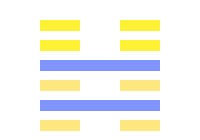
40.2.4.5.6 (40 > 20) - THE KIEH HEXAGRAM.
- 2. The second line, undivided, shows its subject catch, in hunting, three foxes, and obtain the yellow ( = golden) arrows. With firm correctness there will be good fortune.
- 4. (To the subject of) the fourth line, undivided, (it is said), ‘Remove your toes. Friends will (then) come, between you and whom there will be mutual confidence.’
- 5. The fifth line, divided, shows (its subject), the superior man ( = the ruler), executing his function of removing (whatever is injurious to the idea of the hexagram), in which case there will be good fortune, and confidence in him will be shown even by the small men.
- 6. In the sixth line, divided, we see a feudal prince (with his bow) shooting at a falcon on the top of a high wall, and hitting it. (The effect of his action) will be in every way advantageous.
40.2.4.5.6 (40 > 20) - Going with one's instincts
One must part with a sense of embarrassment.
Bing DeepL Google Yandex40.2.4.5.6 (40 > 20) - Going with one's instincts
One must part with a sense of embarrassment.
Bing DeepL Google Yandex40.2.4.5.6 (40 > 20) - Kieh, la libération
Kieh : 1. Délivrer, faire échapper, échapper au danger ; 2. Disperser ; 3. Ouvrir, séparer, s’ouvrir. Se dit du mouvement de la germination. 4. Résoudre une difficulté, une complication.
- 2. Délivrer est aussi heureux que, pour le chasseur, prendre trois renards et obtenir le prix, la flèche d’or. — Celui qui résout une difficulté, fait sortir d’une position difficile, est comme le chasseur qui prend trois renards et obtient la flèche d’or.
-
4. Échappez d’abord et après cela les amis viendront témoigner leur fidélité (sinon ils vous abandonnent).
Note. Le mot qui signifie ordinairement gros orteil est expliqué par les commentateurs comme ayant ici le sens de tchū, commencement, d’abord - 5. C’est au sage d’écarter (les maux) et de résoudre (les difficultés) ; s’il y réussit, il gagnera la confiance du vulgaire.
- 6. Si le prince est assez habile pour atteindre d’une flèche un faucon posé sur le haut d’un mur élevé, il aura le succès et saura disperser les rebelles.
40.2.4.5.6 (40 > 20) - Suivre son instinct
On doit se séparer d'un sentiment de gêne.
Bing DeepL Google Yandex40.2.4.5.6 (40 > 20) - Módosítás
- 2. Megkérik hogy válaszokat keressen mielőtt túl késő.
- 4. Ajtók fognak megnyílni ha valaki felhagy a felesleges kényelemkereséssel.
- 5. Csak egy alkalmas személy tudja megmutatni a megoldást.
- 6. Miután felkészül, meg tudja oldani a problémákat időben.
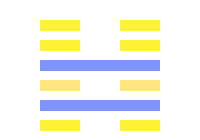
40.1.2.4.5.6 (40 > 42) - THE KIEH HEXAGRAM.
- 1. The first line, divided, shows that its subject will commit no error.
- 2. The second line, undivided, shows its subject catch, in hunting, three foxes, and obtain the yellow ( = golden) arrows. With firm correctness there will be good fortune.
- 4. (To the subject of) the fourth line, undivided, (it is said), ‘Remove your toes. Friends will (then) come, between you and whom there will be mutual confidence.’
- 5. The fifth line, divided, shows (its subject), the superior man ( = the ruler), executing his function of removing (whatever is injurious to the idea of the hexagram), in which case there will be good fortune, and confidence in him will be shown even by the small men.
- 6. In the sixth line, divided, we see a feudal prince (with his bow) shooting at a falcon on the top of a high wall, and hitting it. (The effect of his action) will be in every way advantageous.
40.1.2.4.5.6 (40 > 42) - Rooting out the evil
One is totally involved so that others would act quickly.
Bing DeepL Google Yandex40.1.2.4.5.6 (40 > 42) - Rooting out the evil
One is totally involved so that others would act quickly.
Bing DeepL Google Yandex40.1.2.4.5.6 (40 > 42) - Kieh, la libération
Kieh : 1. Délivrer, faire échapper, échapper au danger ; 2. Disperser ; 3. Ouvrir, séparer, s’ouvrir. Se dit du mouvement de la germination. 4. Résoudre une difficulté, une complication.
-
1. Délivrer quelqu’un est chose excellente.
Quand le fort et le faible s’entendent selon la justice, il n’y a pas de faute à craindre. - 2. Délivrer est aussi heureux que, pour le chasseur, prendre trois renards et obtenir le prix, la flèche d’or. — Celui qui résout une difficulté, fait sortir d’une position difficile, est comme le chasseur qui prend trois renards et obtient la flèche d’or.
-
4. Échappez d’abord et après cela les amis viendront témoigner leur fidélité (sinon ils vous abandonnent).
Note. Le mot qui signifie ordinairement gros orteil est expliqué par les commentateurs comme ayant ici le sens de tchū, commencement, d’abord - 5. C’est au sage d’écarter (les maux) et de résoudre (les difficultés) ; s’il y réussit, il gagnera la confiance du vulgaire.
- 6. Si le prince est assez habile pour atteindre d’une flèche un faucon posé sur le haut d’un mur élevé, il aura le succès et saura disperser les rebelles.
40.1.2.4.5.6 (40 > 42) - Crever l'abcès
On est totalement impliqué pour que les autres fassent vite.
Bing DeepL Google Yandex40.1.2.4.5.6 (40 > 42) - Módosítás
- 1. Fel akarja szabadítani magát, ez egy jó döntés.
- 2. Megkérik hogy válaszokat keressen mielőtt túl késő.
- 4. Ajtók fognak megnyílni ha valaki felhagy a felesleges kényelemkereséssel.
- 5. Csak egy alkalmas személy tudja megmutatni a megoldást.
- 6. Miután felkészül, meg tudja oldani a problémákat időben.

40.3.4.5.6 (40 > 57) - THE KIEH HEXAGRAM.
- 3. The third line, divided, shows a porter with his burden, (yet) riding in a carriage. He will (only) tempt robbers to attack him. However firm and correct he may (try to) be, there will be cause for regret.
- 4. (To the subject of) the fourth line, undivided, (it is said), ‘Remove your toes. Friends will (then) come, between you and whom there will be mutual confidence.’
- 5. The fifth line, divided, shows (its subject), the superior man ( = the ruler), executing his function of removing (whatever is injurious to the idea of the hexagram), in which case there will be good fortune, and confidence in him will be shown even by the small men.
- 6. In the sixth line, divided, we see a feudal prince (with his bow) shooting at a falcon on the top of a high wall, and hitting it. (The effect of his action) will be in every way advantageous.
40.3.4.5.6 (40 > 57) - Taming with sweetness
One prepares more snacks for others to regain strength.
Bing DeepL Google Yandex40.3.4.5.6 (40 > 57) - Taming with sweetness
One prepares more snacks for others to regain strength.
Bing DeepL Google Yandex40.3.4.5.6 (40 > 57) - Kieh, la libération
Kieh : 1. Délivrer, faire échapper, échapper au danger ; 2. Disperser ; 3. Ouvrir, séparer, s’ouvrir. Se dit du mouvement de la germination. 4. Résoudre une difficulté, une complication.
-
3. Si un porteur se met dans un char et qu’il survienne des voleurs, il sera attaqué et échappera difficilement ; s’il abandonne sa charge, il pourra se sauver.
Pour un porteur, aller en char est honteux ; c’est attirer sur soi les voleurs.
Il n’appartient pas à des gens du commun d’aller en char . -
4. Échappez d’abord et après cela les amis viendront témoigner leur fidélité (sinon ils vous abandonnent).
Note. Le mot qui signifie ordinairement gros orteil est expliqué par les commentateurs comme ayant ici le sens de tchū, commencement, d’abord - 5. C’est au sage d’écarter (les maux) et de résoudre (les difficultés) ; s’il y réussit, il gagnera la confiance du vulgaire.
- 6. Si le prince est assez habile pour atteindre d’une flèche un faucon posé sur le haut d’un mur élevé, il aura le succès et saura disperser les rebelles.
40.3.4.5.6 (40 > 57) - Apprivoiser par la douceur
On prépare d'autres casse-croûtes pour que les autres puissent reprendre des forces.
Bing DeepL Google Yandex40.3.4.5.6 (40 > 57) - Módosítás
- 3. Ha valaki elhanyagolja, másoknak adja.
- 4. Ajtók fognak megnyílni ha valaki felhagy a felesleges kényelemkereséssel.
- 5. Csak egy alkalmas személy tudja megmutatni a megoldást.
- 6. Miután felkészül, meg tudja oldani a problémákat időben.

40.1.3.4.5.6 (40 > 9) - THE KIEH HEXAGRAM.
- 1. The first line, divided, shows that its subject will commit no error.
- 3. The third line, divided, shows a porter with his burden, (yet) riding in a carriage. He will (only) tempt robbers to attack him. However firm and correct he may (try to) be, there will be cause for regret.
- 4. (To the subject of) the fourth line, undivided, (it is said), ‘Remove your toes. Friends will (then) come, between you and whom there will be mutual confidence.’
- 5. The fifth line, divided, shows (its subject), the superior man ( = the ruler), executing his function of removing (whatever is injurious to the idea of the hexagram), in which case there will be good fortune, and confidence in him will be shown even by the small men.
- 6. In the sixth line, divided, we see a feudal prince (with his bow) shooting at a falcon on the top of a high wall, and hitting it. (The effect of his action) will be in every way advantageous.
40.1.3.4.5.6 (40 > 9) - Just saying no
One can contradict others without having to demonstrate.
Bing DeepL Google Yandex40.1.3.4.5.6 (40 > 9) - Just saying no
One can contradict others without having to demonstrate.
Bing DeepL Google Yandex40.1.3.4.5.6 (40 > 9) - Kieh, la libération
Kieh : 1. Délivrer, faire échapper, échapper au danger ; 2. Disperser ; 3. Ouvrir, séparer, s’ouvrir. Se dit du mouvement de la germination. 4. Résoudre une difficulté, une complication.
-
1. Délivrer quelqu’un est chose excellente.
Quand le fort et le faible s’entendent selon la justice, il n’y a pas de faute à craindre. -
3. Si un porteur se met dans un char et qu’il survienne des voleurs, il sera attaqué et échappera difficilement ; s’il abandonne sa charge, il pourra se sauver.
Pour un porteur, aller en char est honteux ; c’est attirer sur soi les voleurs.
Il n’appartient pas à des gens du commun d’aller en char . -
4. Échappez d’abord et après cela les amis viendront témoigner leur fidélité (sinon ils vous abandonnent).
Note. Le mot qui signifie ordinairement gros orteil est expliqué par les commentateurs comme ayant ici le sens de tchū, commencement, d’abord - 5. C’est au sage d’écarter (les maux) et de résoudre (les difficultés) ; s’il y réussit, il gagnera la confiance du vulgaire.
- 6. Si le prince est assez habile pour atteindre d’une flèche un faucon posé sur le haut d’un mur élevé, il aura le succès et saura disperser les rebelles.
40.1.3.4.5.6 (40 > 9) - Se contenter de dire non
On peut contredire les autres sans avoir à faire de démonstration.
Bing DeepL Google Yandex40.1.3.4.5.6 (40 > 9) - Módosítás
- 1. Fel akarja szabadítani magát, ez egy jó döntés.
- 3. Ha valaki elhanyagolja, másoknak adja.
- 4. Ajtók fognak megnyílni ha valaki felhagy a felesleges kényelemkereséssel.
- 5. Csak egy alkalmas személy tudja megmutatni a megoldást.
- 6. Miután felkészül, meg tudja oldani a problémákat időben.
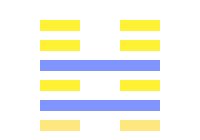
40.2.3.4.5.6 (40 > 53) - THE KIEH HEXAGRAM.
- 2. The second line, undivided, shows its subject catch, in hunting, three foxes, and obtain the yellow ( = golden) arrows. With firm correctness there will be good fortune.
- 3. The third line, divided, shows a porter with his burden, (yet) riding in a carriage. He will (only) tempt robbers to attack him. However firm and correct he may (try to) be, there will be cause for regret.
- 4. (To the subject of) the fourth line, undivided, (it is said), ‘Remove your toes. Friends will (then) come, between you and whom there will be mutual confidence.’
- 5. The fifth line, divided, shows (its subject), the superior man ( = the ruler), executing his function of removing (whatever is injurious to the idea of the hexagram), in which case there will be good fortune, and confidence in him will be shown even by the small men.
- 6. In the sixth line, divided, we see a feudal prince (with his bow) shooting at a falcon on the top of a high wall, and hitting it. (The effect of his action) will be in every way advantageous.
40.2.3.4.5.6 (40 > 53) - Being convinced of one's success
One should necessarily be selected since one has met all the criteria and the others have not been as skilled.
Bing DeepL Google Yandex40.2.3.4.5.6 (40 > 53) - Being convinced of one's success
One should necessarily be selected since one has met all the criteria and the others have not been as skilled.
Bing DeepL Google Yandex40.2.3.4.5.6 (40 > 53) - Kieh, la libération
Kieh : 1. Délivrer, faire échapper, échapper au danger ; 2. Disperser ; 3. Ouvrir, séparer, s’ouvrir. Se dit du mouvement de la germination. 4. Résoudre une difficulté, une complication.
- 2. Délivrer est aussi heureux que, pour le chasseur, prendre trois renards et obtenir le prix, la flèche d’or. — Celui qui résout une difficulté, fait sortir d’une position difficile, est comme le chasseur qui prend trois renards et obtient la flèche d’or.
-
3. Si un porteur se met dans un char et qu’il survienne des voleurs, il sera attaqué et échappera difficilement ; s’il abandonne sa charge, il pourra se sauver.
Pour un porteur, aller en char est honteux ; c’est attirer sur soi les voleurs.
Il n’appartient pas à des gens du commun d’aller en char . -
4. Échappez d’abord et après cela les amis viendront témoigner leur fidélité (sinon ils vous abandonnent).
Note. Le mot qui signifie ordinairement gros orteil est expliqué par les commentateurs comme ayant ici le sens de tchū, commencement, d’abord - 5. C’est au sage d’écarter (les maux) et de résoudre (les difficultés) ; s’il y réussit, il gagnera la confiance du vulgaire.
- 6. Si le prince est assez habile pour atteindre d’une flèche un faucon posé sur le haut d’un mur élevé, il aura le succès et saura disperser les rebelles.
40.2.3.4.5.6 (40 > 53) - Être convaincu de sa réussite
On devrait forcément être retenu puisqu'on a satisfait tous les critères et que les autres n'ont pas été aussi habiles.
Bing DeepL Google Yandex40.2.3.4.5.6 (40 > 53) - Módosítás
- 2. Megkérik hogy válaszokat keressen mielőtt túl késő.
- 3. Ha valaki elhanyagolja, másoknak adja.
- 4. Ajtók fognak megnyílni ha valaki felhagy a felesleges kényelemkereséssel.
- 5. Csak egy alkalmas személy tudja megmutatni a megoldást.
- 6. Miután felkészül, meg tudja oldani a problémákat időben.
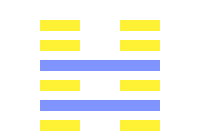
40.1.2.3.4.5.6 (40 > 37) - THE KIEH HEXAGRAM.
- 1. The first line, divided, shows that its subject will commit no error.
- 2. The second line, undivided, shows its subject catch, in hunting, three foxes, and obtain the yellow ( = golden) arrows. With firm correctness there will be good fortune.
- 3. The third line, divided, shows a porter with his burden, (yet) riding in a carriage. He will (only) tempt robbers to attack him. However firm and correct he may (try to) be, there will be cause for regret.
- 4. (To the subject of) the fourth line, undivided, (it is said), ‘Remove your toes. Friends will (then) come, between you and whom there will be mutual confidence.’
- 5. The fifth line, divided, shows (its subject), the superior man ( = the ruler), executing his function of removing (whatever is injurious to the idea of the hexagram), in which case there will be good fortune, and confidence in him will be shown even by the small men.
- 6. In the sixth line, divided, we see a feudal prince (with his bow) shooting at a falcon on the top of a high wall, and hitting it. (The effect of his action) will be in every way advantageous.
40.1.2.3.4.5.6 (40 > 37) - Requesting a transfer
One brings up ancient prayers from the past.
Bing DeepL Google Yandex40.1.2.3.4.5.6 (40 > 37) - Requesting a transfer
One brings up ancient prayers from the past.
Bing DeepL Google Yandex40.1.2.3.4.5.6 (40 > 37) - Kieh, la libération
Kieh : 1. Délivrer, faire échapper, échapper au danger ; 2. Disperser ; 3. Ouvrir, séparer, s’ouvrir. Se dit du mouvement de la germination. 4. Résoudre une difficulté, une complication.
-
1. Délivrer quelqu’un est chose excellente.
Quand le fort et le faible s’entendent selon la justice, il n’y a pas de faute à craindre. - 2. Délivrer est aussi heureux que, pour le chasseur, prendre trois renards et obtenir le prix, la flèche d’or. — Celui qui résout une difficulté, fait sortir d’une position difficile, est comme le chasseur qui prend trois renards et obtient la flèche d’or.
-
3. Si un porteur se met dans un char et qu’il survienne des voleurs, il sera attaqué et échappera difficilement ; s’il abandonne sa charge, il pourra se sauver.
Pour un porteur, aller en char est honteux ; c’est attirer sur soi les voleurs.
Il n’appartient pas à des gens du commun d’aller en char . -
4. Échappez d’abord et après cela les amis viendront témoigner leur fidélité (sinon ils vous abandonnent).
Note. Le mot qui signifie ordinairement gros orteil est expliqué par les commentateurs comme ayant ici le sens de tchū, commencement, d’abord - 5. C’est au sage d’écarter (les maux) et de résoudre (les difficultés) ; s’il y réussit, il gagnera la confiance du vulgaire.
- 6. Si le prince est assez habile pour atteindre d’une flèche un faucon posé sur le haut d’un mur élevé, il aura le succès et saura disperser les rebelles.
40.1.2.3.4.5.6 (40 > 37) - Demander une mutation
On fait ressurgir du passé d'antiques prières.
Bing DeepL Google Yandex40.1.2.3.4.5.6 (40 > 37) - Módosítás
- 1. Fel akarja szabadítani magát, ez egy jó döntés.
- 2. Megkérik hogy válaszokat keressen mielőtt túl késő.
- 3. Ha valaki elhanyagolja, másoknak adja.
- 4. Ajtók fognak megnyílni ha valaki felhagy a felesleges kényelemkereséssel.
- 5. Csak egy alkalmas személy tudja megmutatni a megoldást.
- 6. Miután felkészül, meg tudja oldani a problémákat időben.

